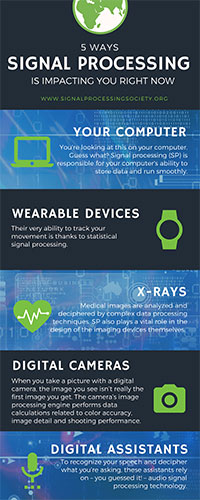
So much of our daily lives are powered by signal processing technologies. They go unnoticed mostly because that’s the purpose – to help our lives run more seamlessly, with little to no impact. For example, you’re probably reading this blog on your computer. Guess what? Signal processing is responsible for your computer’s ability to store data and run smoothly.
Here are 4 Additional Ways Signal Process Technologies Impact You:

- Smartwatches/Wearable Devices: Thanks to microcontrollers, semiconductor memories and micro electromechanical sensor (MEMS) technology, our smartwatches have gotten smaller. Beyond that, their very ability to track your movement is also thanks to statistical signal processing. Just as smartphones do far more than make phone calls, smartwatches are only partially meant to tell you what time it is. They – and many other wearable devices – increasingly track your mileage while exercising, measure your heart rate, count calories, and otherwise contribute to a healthy regimen. They may soon be used to detect serious medical problems and allow doctors to give remote diagnoses – all made possible by signal processing.
- X-Rays, CT Scans and MRIs. Signal processing isn’t only contributing to future medical breakthroughs; it’s been helping medical professionals for years. Advances in medical imaging allow doctors to diagnose diseases before they spread, without having to physically look inside the patient. Signal processing plays a role in every step of the process. Medical images are analyzed and deciphered by complex data processing techniques. More than that, signal processing plays a vital role in the design of the imaging devices themselves.
- Digital Cameras: When you take a picture with a digital camera, the image you ultimately see isn’t the first image you get. Rather, the camera’s image processing engine must perform data calculations related to color accuracy, image detail and shooting performance. Only then does it produce a high-quality, color digital photograph. And what is essential to the image processing engine? Signal processing.
- Digital Assistants: Few new technologies have transformed our daily lives so quickly in recent years as our new digital personal assistants like Amazon’s Alexa or Google Home, who can deliver to us information and entertainment at a whim. But how do these modern marvels actually work? To recognize your speech and decipher what you’re asking, these assistants rely on – you guessed it! – audio signal processing technology. Signal processing engineers are the brains behind the digital assistants’ ability to tune out interfering noise and receive your commands.
Signal processing is the hidden mover and shaker of the new digital economy and our increasingly digitalized social lives. Opportunities in the field are enormous, lucrative and ever-expanding in scope.
